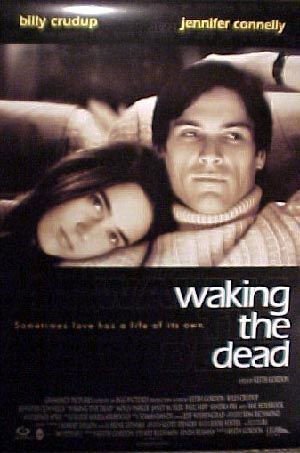"Political Returns to Me"

| None | Light | Moderate | Heavy | |
|---|---|---|---|---|
| Language | ||||
| Violence | ||||
| Sex | ||||
| Nudity |
What You Need To Know:
Minor actors Crudup and Connelly do their best work ever here. Intricacies of political and moral ambition are fully explored, especially how they interrelate with keeping an honest romance going. Though Fielding shuns church and any profession of faith, Sarah finds meaning in working with the Catholic church. Despite her faith, she fornicates with no remorse. Unlike THE SIXTH SENSE, WAKING THE DEAD always dances around the subject of ghosts and doesn’t support occult teaching. Other objectionable content includes some foul language and marijuana smoking.
Content:
(RoRo, B, PC, C, V, LLL, SSS, NNN, AA, DD, M) Primarily romantic worldview where not even death can separate young lovers fueled by some moral but mainly liberal political idealism with a few Christian elements of church going, blessings & prayers & priests show compassion to their fellow men; 43 obscenities & 9 profanities; mild violence including slugging & death through car bomb; two instances of depicted fornication, implied masturbation & some strong kissing; upper female nudity, upper male nudity & full female & full male nudity with private parts carefully obscured; alcohol use & one brief scene of minor drunken character; smoking & briefly depicted marijuana use; and, lying, theft by thugs & scary scenes of hallucinations.
More Detail:
Getting past the political rhetoric, vows of undying love, finely written arguments, and good acting, the basic premise of WAKING THE DEAD is that, if at all possible, you should always look at the corpse of a deceased loved one to bring closure in your life to confirm that they are indeed dead. A fine minor effort produced by Jodie Foster, this tale of a struggle for sanity in the midst of a political race is marred by fornication, which goes against the faith of one of the people who indulge in it.
It is 1972 and young coast guard officer Fielding Pierce (Billy Crudup – in a fine JFK, Jr. impersonation) meets a passionate hippie activist Sarah Williams (Jennifer Connelly). Though he seeks change through politics and she seeks change through protests and volunteerism, they both recognize and appreciate the ideals of each other. Though Sarah is a professed Catholic, she and Billy become lovers.
By 1974, Billy’s political ambitions are conflicting with Sarah’s idealism. Though still together, they are fighting if they are right for each other. In 1974, Sarah decides to participate in a rescue of some Chilean freedom fighters, but is murdered in a car bombing, which devastates Fielding.
Eight years pass, and in 1982, he is running for Congress, with his live-in girlfriend Juliet Beck (Molly Parker) by his side. Molly is a cutthroat politician, holding little or no ideals and acts solely on what is expedient. As Election Day draws near, Fielding has visions of Sarah. He sees her nearly everywhere. He doesn’t know if he is going insane, or if she, in fact, could still be alive. His ill behavior toward all this alienates him from his campaign team, and worries mount as to his mental health. Finally, in a moment of catharsis, Fielding is able to put his worries about Sarah aside and serve his constituency.
Aside from one too many crying scenes, Crudup does his best work here. Likewise, Connelly, usually cast as eye candy, stretches herself in a fine role which should help her capture better future roles like Crudup. Other acting is serviceable, but Paul Hipp (as Fielding’s brother Danny) is a pot-smoking goofball. Many of the scenes between Crudup and Connelly shine with great writing. Intricacies of political and moral ambition are fully explored, especially how they interrelate with keeping an honest romance going. Politics is mentioned as a corrupt field, but political superiority is also rebuked.
Though Fielding shuns church and any profession of faith, Sarah finds meaning in working with the church. In fact, in one scene where Fielding thinks he sees her, he chases after her, and she runs into a church. Perhaps this is a message of her trying to say that his service could be fueled by a service to God. Despite her faith, however, and this is most disturbing, she fornicates with no remorse or sense of shame. Apparently, she and/or the filmmakers can reconcile this with her faith. Or, perhaps her faith is meaningless. Either way, her dedication to a godless, but well meaning, servant of the state detracts from any sympathies the audience may have with her.
Unlike THE SIXTH SENSE, where it is understood that a human is actually seeing ghosts, this movie always dances around this subject and, hence, doesn’t support any occult teaching. Fielding’s visions of Sarah remain just that: visions, and neither he nor anyone else can verify her death.
WAKING THE DEAD may be a tough movie to sell. The stars are good but virtually unknown, there are no special effects or big budget, and stories of political ambition tend to have a sparse audience (think PRIMARY COLORS). Stories of lovers separated by death and the lengths to which they go in order to join again also have trouble (think WHAT DREAMS MAY COME). However, in this new millennium, tales with supernatural dustings are commonplace and some do very well (think THE SIXTH SENSE). WAKING THE DEAD may be a critical fav, but a crowd head scratcher.



 - Content:
- Content: 



